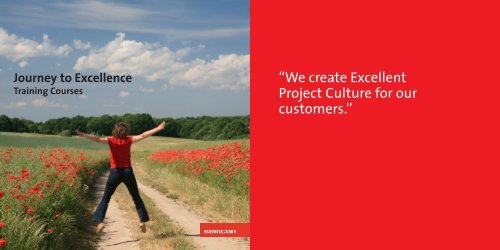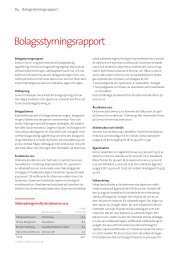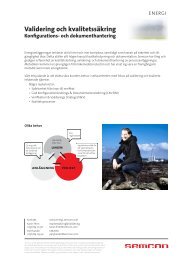Develop your project management skills - Semcon
Develop your project management skills - Semcon
Develop your project management skills - Semcon
Create successful ePaper yourself
Turn your PDF publications into a flip-book with our unique Google optimized e-Paper software.
Journey to Excellence<br />
Training Courses<br />
“We create Excellent<br />
Project Culture for our<br />
customers.”
2<br />
Contents • Courses<br />
Courses Page<br />
XLPM (PROPS) for Team Members 7<br />
XLPM (PROPS) for Project Managers 8<br />
Project Methodology according to PMBOK® 9<br />
PMP® Exam Preparation Program 10<br />
PMP® Exam Preparation Course 11<br />
CAPM® Exam Preparation Course 12<br />
Prince2® Foundation 14<br />
Prince2® Practitioner 15<br />
Project Planning and Control 16<br />
Earned Value in Projects 17<br />
Project Finance 18<br />
Risk Management in Projects 19<br />
Program Management - XLPM 20<br />
Project Control with Microsoft Project 21<br />
Scrum in XLPM (PROPS V4) 22<br />
Workshop for Sponsors 27<br />
Project Portfolio Management - XLPM 29<br />
Project Management Office 30<br />
Business Decisions in Projects 31<br />
Program for Experienced Project Managers 32<br />
XLPM (PROPS) for Line Managers 33<br />
Human Skills for Project Managers 37<br />
Human Skills II - Efficient Teams 38<br />
Communication Management and Skills 39<br />
Conflict Handling in Projects 40<br />
Coaching Leadership in <strong>project</strong>s 41<br />
S<br />
S<br />
S<br />
S<br />
S<br />
S<br />
S<br />
S<br />
S<br />
S<br />
S<br />
S<br />
S<br />
Support<br />
Project administrators<br />
Project economists<br />
Project planners<br />
Project portfolio managers<br />
Project office managers<br />
C<br />
C<br />
C<br />
C<br />
C<br />
Colleagues<br />
Project team members<br />
P1<br />
P1<br />
P1<br />
P1<br />
P1<br />
P1<br />
P1<br />
P1<br />
P1<br />
P1<br />
P1<br />
P1<br />
P1<br />
P1<br />
P1<br />
P1<br />
Project managers • Step 1<br />
Basic training<br />
Project managers • Step 2<br />
Senior <strong>project</strong> managers<br />
P2<br />
P2<br />
P2<br />
P2<br />
P2<br />
P2<br />
P2<br />
P2<br />
P2<br />
P2<br />
Project managers • Step 3<br />
Master <strong>project</strong> managers<br />
Program manager<br />
P3 L<br />
P3<br />
P3<br />
Line managers<br />
Project portfolio owner<br />
Project sponsors<br />
Program sponsors<br />
Steering group members<br />
L<br />
L<br />
L<br />
L<br />
L<br />
L<br />
L<br />
L<br />
L<br />
L<br />
L<br />
L<br />
L<br />
L<br />
<strong>Develop</strong> <strong>your</strong> <strong>project</strong> <strong>management</strong> <strong>skills</strong><br />
Learn which tools and methods are needed for<br />
effective, flexible <strong>project</strong> work. At the same time,<br />
you improve <strong>your</strong> knowledge of <strong>project</strong>-related<br />
business law and budget work.<br />
<strong>Develop</strong> <strong>your</strong> business <strong>skills</strong><br />
We focus on how you approach a <strong>project</strong> from a<br />
business perspective by putting the customer first<br />
and distributing resources in the best way. Learn<br />
also to assess business opportunities in line with<br />
<strong>your</strong> company’s strategies.<br />
<strong>Develop</strong> <strong>your</strong> understanding of the human perspective<br />
Through clear communication, shared goals and<br />
a good understanding of group dynamics you can<br />
lead <strong>your</strong>self and others to brilliant results.<br />
Important updates<br />
PROPS for Project Managers has changed name to:<br />
XLPM for Project Managers<br />
Introduction to PROPS has changed name to:<br />
XLPM for Team Members<br />
PROPS for Line Managers has changed name to:<br />
XLPM for Line Managers<br />
Scrum in PROPS V4 has changed name to: Scrum in XLPM<br />
3
4<br />
Other contents<br />
Page<br />
<strong>Develop</strong>ing <strong>your</strong> <strong>project</strong> <strong>management</strong> <strong>skills</strong> 6<br />
Project Management Institute (PMI) 22<br />
Toyota’s <strong>project</strong> portfolio in good order 24<br />
<strong>Develop</strong>ing <strong>your</strong> business <strong>skills</strong> 26<br />
XLPM - Excellence in Project Management 34<br />
Popular Trainer 35<br />
<strong>Develop</strong>ing <strong>your</strong> understanding of the human perspective 36<br />
Contact information 42<br />
“We Help You to<br />
Build an Excellent<br />
Project Culture”<br />
7
6<br />
<strong>Develop</strong> <strong>your</strong> <strong>project</strong> <strong>management</strong> <strong>skills</strong><br />
To become successful and profitable, you and <strong>your</strong> organization need to do more at<br />
lower costs with fewer resources. You also have to do it in less time while balancing<br />
constant change. The key is an effective, flexible <strong>project</strong> process – but for this to<br />
work you need a structured work method and the right <strong>skills</strong>.<br />
We offer training to all involved in a <strong>project</strong> – both those on the team and<br />
supporting functions. Our range covers every aspect of <strong>project</strong> <strong>management</strong>, from<br />
basic knowledge about methods for planning, completion, follow-up and steering<br />
to more detailed, expert knowledge. Learn how to steer time schedules, budgets,<br />
deliveries and how to coordinate <strong>project</strong>s and <strong>project</strong> portfolios to become more<br />
profitable. Improve <strong>your</strong> <strong>skills</strong> in managing risks and realizing both short-term and<br />
long-term objectives.<br />
Our internationally experienced and talented consultants can help you plan<br />
a suitable career path and individual competence development plan. We can<br />
even give you access to a mentor or coach.<br />
On-site at customers YES Customized YES Training<br />
Scheduled<br />
XLPM for Team Members • 1 day<br />
You will be directly or indirectly affected by <strong>project</strong>s if you<br />
work in an organization where activities are conducted as<br />
<strong>project</strong>s. It is therefore important that you understand the<br />
work method behind a <strong>project</strong> and how you can contribute<br />
to a successful <strong>project</strong>. This course teaches you the basics<br />
of XLPM, a general model for managing and steering<br />
<strong>project</strong>s.<br />
”Introduction to PROPS” has changed<br />
name to ”XLPM for Team Members”<br />
YES<br />
E-learning<br />
NO<br />
Documentation<br />
After the course, you will<br />
• Have basic knowledge of <strong>project</strong>s as a work method<br />
and the significance of a common <strong>project</strong> culture<br />
• Be able to identify and understand the different roles<br />
in a <strong>project</strong> organization<br />
• Know about the <strong>project</strong> <strong>management</strong> model, XLPM<br />
Subjects<br />
• Multi-<strong>project</strong> organizations<br />
• Two perspectives of <strong>project</strong> work:<br />
– The business perspective<br />
– The human perspective<br />
• Two models of <strong>project</strong> work:<br />
– The <strong>project</strong> life cycle.<br />
– The <strong>project</strong> organization<br />
• Project <strong>management</strong>’s areas of expertise<br />
Target group<br />
Project team members and those who need to know the basics<br />
about XLPM. If you are a <strong>project</strong> manager, <strong>project</strong> planner or<br />
<strong>project</strong> administrator, you should instead choose XLPM for<br />
Project Managers. Line managers should choose XLPM for<br />
Line Managers or XLPM for Project Managers.<br />
Documentation<br />
XLPM documentation.<br />
PDU-points 8<br />
Read more<br />
on page 23.<br />
XLPM<br />
Read more<br />
on page 34.<br />
C<br />
7
8<br />
On-site at customers YES Customized YES Training<br />
Scheduled<br />
XLPM for Project Managers • 3 days<br />
Doing the right thing in the right order sounds pretty obvious.<br />
But what is “right” to one person may not be to another. One<br />
of <strong>your</strong> most important tasks as <strong>project</strong> manager is to make<br />
it obvious to everyone on <strong>your</strong> team who is doing what and<br />
the time frame that applies. To do so you need the right<br />
tools. In this course, you will explore the XLPM model and<br />
how you can use it to create a common outlook and clar-<br />
ity in <strong>your</strong> <strong>project</strong>. You will also carry out a smaller <strong>project</strong><br />
using the XLPM model so you can practice what you have<br />
learned.<br />
”PROPS for Project Managers” has<br />
changed name to ”XLPM for Project<br />
Managers”<br />
S<br />
P1<br />
L<br />
YES<br />
E-learning<br />
NO<br />
Documentation<br />
After the course, you will<br />
• Understand the <strong>project</strong> work form and the importance<br />
of a common <strong>project</strong> culture<br />
• Understand the <strong>project</strong> manager’s role in a multi-<strong>project</strong><br />
organization<br />
• Be able to use the XLPM <strong>project</strong> <strong>management</strong> model<br />
Subjects<br />
• Projects in a multi-<strong>project</strong> organization<br />
• Two perspectives of <strong>project</strong> work:<br />
– The business perspective<br />
– The human perspective<br />
• The ten knowledge areas of <strong>project</strong> <strong>management</strong><br />
• The individual <strong>project</strong> in practice: from pre-study to conclusion<br />
• XLPM documentation and support<br />
Target group<br />
Project managers, <strong>project</strong> members, <strong>project</strong> administrators,<br />
line managers, program managers, <strong>project</strong> portfolio managers,<br />
<strong>project</strong> sponsors and <strong>project</strong> office managers.<br />
Documentation<br />
XLPM documentation.<br />
PDU-points 24<br />
Read more<br />
on page 23.<br />
XLPM<br />
Read more<br />
on page 34.<br />
On-site at customers YES Customized YES Training<br />
Scheduled<br />
Project Methodology according to PMBOK® • 3 days<br />
This course provides an introduction to <strong>project</strong> methodology<br />
and is intended for those who need basic knowledge of<br />
<strong>project</strong> <strong>management</strong>. The course is based on the international<br />
de facto standard PMBOK® Guide published by the Project<br />
Management Institute (PMI®).<br />
YES<br />
E-learning<br />
NO<br />
Documentation<br />
After the course, you will<br />
• Better understand what a <strong>project</strong> is<br />
• Better understand what <strong>project</strong> <strong>management</strong> is<br />
• Better understand how to initiate, plan, execute,<br />
control and close <strong>project</strong>s<br />
Subjects<br />
• Project life cycle<br />
• Project stakeholders<br />
• The matrix organization<br />
• The requirement specification<br />
• Project <strong>management</strong> processes<br />
• Work breakdown structure<br />
• Network diagrams<br />
• The critical path<br />
• The <strong>project</strong> schedule<br />
• The responsibility assignment matrix<br />
• The <strong>project</strong> budget<br />
• Risk <strong>management</strong><br />
Target group<br />
Project members, <strong>project</strong> administrators, <strong>project</strong> controllers,<br />
<strong>project</strong> planners, <strong>project</strong> managers, line managers, program<br />
managers, portfolio managers, <strong>project</strong> sponsors and <strong>project</strong><br />
office managers.<br />
Documentation<br />
PMBOK® Guide and <strong>Semcon</strong> compendium.<br />
PDU-points 24<br />
Read more<br />
on page 23.<br />
S<br />
P1<br />
L<br />
9
10<br />
On-site at customers YES Customized YES Training<br />
Scheduled<br />
PMP® Exam Preparation Program • 4+2 days<br />
This course provides you with the knowledge and self-<br />
confidence to do well on the Project Management Institute’s<br />
PMP® certification examination. Like the examination,<br />
the course is primarily based on PMI’s Guide to the Project<br />
Management Body of Knowledge (PMBOK® Guide), but<br />
also includes other material relevant for the exam.<br />
The course is made up of two modules held four to six<br />
weeks apart. The first module is a four-day course and<br />
the second is a two-day course.<br />
The course is intended for those who have little or no<br />
experience of the PMBOK® Guide.<br />
Prerequisites<br />
You must be eligible to take the PMP® certification exam.<br />
You have to buy <strong>your</strong> own copy of PMBOK Guide Third Edition<br />
and read it through before the course starts<br />
P1<br />
YES<br />
E-learning<br />
NO<br />
Documentation<br />
After the course, you will<br />
• Understand the concepts and contents of the PMBOK® Guide.<br />
• You will also have enough knowledge and self-confidence to<br />
continue preparing for the exam on <strong>your</strong> own, and to be able<br />
to apply <strong>your</strong> knowledge in <strong>your</strong> job<br />
Subjects<br />
• Exam registration<br />
• The <strong>project</strong> <strong>management</strong> framework<br />
• The <strong>project</strong> <strong>management</strong> process groups<br />
• The <strong>project</strong> <strong>management</strong> knowledge areas<br />
• Professional responsibility according to PMI.<br />
• Homework<br />
• Benchmark exams<br />
• Individual review of performance<br />
Target group<br />
Anyone aspiring to take the exam for PMP certification and who<br />
meets PMI’s prerequisites for participation: <strong>project</strong> managers and<br />
others working with <strong>project</strong>s who need to learn the PMBOK® Guide.<br />
Documentation<br />
<strong>Semcon</strong> compendium.<br />
PDU-points 48<br />
Read more<br />
on page 23.<br />
On-site at customers YES Customized YES Training<br />
Scheduled<br />
PMP® Exam Preparation Course • 3 days<br />
This preparation course is for those who intend to take the<br />
PMP® certification exam. Being certified by an independent,<br />
reputable organization is a mark of quality and, in many<br />
cases, a competitive advantage. Like the examination, the<br />
course is based on PMI’s Guide to the Project Management<br />
Body of Knowledge (PMBOK® Guide), but also includes other<br />
material relevant for the exam.<br />
Prerequisites<br />
You must be an experienced <strong>project</strong> manager and familiar<br />
with the PMBOK® Guide. You must be eligible to take the<br />
PMP® certification exam. You have to buy <strong>your</strong> own copy of<br />
PMBOK Guide Third Edition and read it through before the course<br />
starts.<br />
YES<br />
E-learning<br />
NO<br />
Documentation<br />
After the course, you will<br />
• Understand how the PMP® certification exam is structured<br />
and how to prepare for the exam<br />
• You will also know which knowledge areas you must master<br />
Subjects<br />
• The contents of the certification exam<br />
• Introduction to the PMBOK® Guide<br />
• The nine knowledge areas<br />
• Professional responsibility according to PMI<br />
• Exercises related to exam questions<br />
Target group<br />
Senior <strong>project</strong> managers who intend to take the<br />
PMP® certification exam.<br />
Documentation<br />
A <strong>Semcon</strong> compendium and the PMP® Exam Prep manual by<br />
R. Mulcahy and the Q&As for the PMBOK® Guide.<br />
PDU-points 24<br />
Read more<br />
on page 23.<br />
P2<br />
11
12<br />
On-site at customers YES Customized YES Training<br />
Scheduled<br />
CAPM® Exam Preparation Course • 2 days<br />
This preparation course is for those who intend to take the<br />
CAPM® certification exam. Being certified by an independent,<br />
reputable organization is a mark of quality and, in many<br />
cases, a competitive advantage.<br />
Like the examination, the course is based primarily on<br />
PMI’s Guide to the Project Management Body of Knowledge<br />
(PMBOK® Guide), but also includes other material relevant<br />
for the exam.<br />
Prerequisites<br />
XLPM training for <strong>project</strong> managers or similar where you have a<br />
general idea of how to run a <strong>project</strong> from start to finish. This is<br />
necessary since the PMBOK®’s design does not follow the <strong>project</strong><br />
process, which makes the course too theoretical for those not<br />
aware of how a <strong>project</strong> is run. You must also be eligible to take<br />
the CAPM® certification exam.<br />
You have to buy <strong>your</strong> own copy of PMBOK Guide Third Edition<br />
and read it through before the course starts<br />
C<br />
P1<br />
YES<br />
E-learning<br />
NO<br />
Documentation<br />
After the course, you will<br />
• Know how the PMBOK® is structured and its contents<br />
(5 process groups, 9 knowledge areas and the area of<br />
Professional Responsibility)<br />
• Be able to answer questions related to how the test is<br />
designed and completed<br />
• Be experienced in answering multiple-answer questions<br />
of the type used in the CAPM® test<br />
• Be well aware of the scope of studies required to pass<br />
the CAPM® test<br />
Subjects<br />
• Contents of the certification exam<br />
• Introduction to PMBOK® Guide<br />
• The nine knowledge areas<br />
• Professional responsibility according to PMI<br />
• Exercises in answering exam questions<br />
Target group<br />
Project team member, <strong>project</strong> <strong>management</strong> students, or <strong>project</strong><br />
managers at the start of their careers who are eligible for CAPM®<br />
certification according to PMI and who are preparing to take the<br />
CAPM® test.<br />
Documentation<br />
<strong>Semcon</strong> compendium and the books Hot Topics PMP® Exam<br />
Flashcards – 5th Edition by R. Mulcahy and Q&As for the PMBOK®<br />
Guide Third Edition.<br />
PDU-points 16<br />
Read more about<br />
CAPM® on page 23.<br />
Photo by Hans HoJo Johansson<br />
Attending a course is only valuable...<br />
...if the new <strong>skills</strong> can be applied to and become part of <strong>your</strong> own and <strong>your</strong> company’s<br />
development process. You undoubtedly know what it is like to return to the office after an<br />
excellent workshop, filled with new <strong>skills</strong> and ideas that you want to share. Your colleagues<br />
however cannot really appreciate <strong>your</strong> enthusiasm and they are not really interested – which<br />
isn’t all that strange since they weren’t there. Since we train everyone, from <strong>project</strong> team<br />
members to <strong>management</strong> we can create behavioral changes that will have a lasting effect<br />
throughout <strong>your</strong> entire organization.<br />
13
14<br />
PRINCE 2® Foundation • 2 days<br />
The PRINCE2 Foundation Course covers the whole of the<br />
syllabus of PRINCE2® Foundation Level and prepares partici-<br />
pants for the PRINCE2 Foundation examination. The course is<br />
accredited through the APM Group and is based on the 2009<br />
version of the PRINCE2 manual. The final day of the course will<br />
include the Foundation examination.<br />
On-site at customers YES Customized YES Training<br />
Scheduled<br />
PRojects IN Controlled Environments (PRINCE)is a processbased<br />
approach for <strong>project</strong> <strong>management</strong> providing an easily<br />
tailored and scaleable method for the <strong>management</strong> of all types<br />
of <strong>project</strong>s. The method is the de-facto standard for <strong>project</strong><br />
<strong>management</strong> in the UK and is practiced worldwide.<br />
The continued international development of PRINCE2 examinations,<br />
training and course material is contributing significantly<br />
to the recognition of PRINCE2 as a truly international<br />
standard. More and more people are having the opportunity to<br />
benefit from the training courses and qualifications that are<br />
available worldwide.<br />
Examination<br />
The PRINCE2® Foundation examination is a 75 multiple choice<br />
question paper to be completed in one hour with a pass mark<br />
of 50%.<br />
C<br />
P1<br />
YES<br />
E-learning<br />
NO<br />
Documentation<br />
After the course, you will<br />
• Understand the Principles, Themes, Processes and tailoring of<br />
the PRINCE2® method<br />
• Monitor a <strong>project</strong> within the boundaries of the Project Plan<br />
• Participate effectively in a <strong>project</strong> in accordance with the<br />
PRINCE2® method<br />
Subjects<br />
• The relationship between a <strong>project</strong> and its Business Case<br />
• Detailed explanation of the PRINCE2® Principles, Themes and<br />
Processes<br />
• Roles and associated tasks and responsibilities, within a<br />
PRINCE2® <strong>project</strong><br />
• The <strong>management</strong> of Risks and Issues in a <strong>project</strong><br />
• Structure and contents of a product focused <strong>project</strong> plan<br />
• The <strong>management</strong> of a <strong>project</strong> relative to the <strong>project</strong> plan<br />
• Definition, <strong>management</strong> and acceptance of work packages<br />
Target Group<br />
Project Managers, Team Managers and Team members with<br />
responsibility for or involvement in managing <strong>project</strong>s.<br />
Documentation<br />
Syllabus of the course contents and the case studies<br />
APMG PRINCE2 2009 manual<br />
On-site at customers YES Customized YES Training<br />
Scheduled<br />
PRINCE 2® Practitioner • 3 days<br />
The PRINCE2 Practitioner Course prepares participants for the<br />
PRINCE2 Practitioners examination. Attention will be given<br />
to practical participation in a case study encompassing the<br />
most essential elements of a PRINCE2 <strong>project</strong>. Participants<br />
will explore the relationship between the Business Case and<br />
the <strong>project</strong> and develop specific PRINCE2 products during the<br />
course. The final day of the course will include the Practitio-<br />
ners examination. The course is accredited through The APM<br />
Group and based on the 2009 version of the PRINCE2 manual.<br />
The Prince2® certification process consists of two stages:<br />
• If you want to become a certified and registered PRINCE2<br />
Practitioner, you first have to take the Foundation Exam and<br />
then the Practitioner Exam.<br />
• You can take both exams in the same week or even on the<br />
same day, or you can spread them over months or even years.<br />
• If you take both exams in one week, you will only receive the<br />
Practitioner certificate. A separate Foundation certificate is<br />
not necessary since you can only take the Practitioner Exam if<br />
you have passed the Foundation Exam.<br />
Examination<br />
The PRINCE2 Practitioner examination is a 2.5 hour multiple<br />
choice objective test examination consisting of nine questions<br />
based on a given scenario. Each question is worth 12 marks and<br />
tests <strong>your</strong> knowledge in terms of application of the methodology<br />
to the scenario and in general. As from 6 July, 2009 the pass mark<br />
for the exam is 55% (59 marks).<br />
YES<br />
E-learning<br />
NO<br />
Documentation<br />
After the course, you will<br />
• Set up and manage complex <strong>project</strong>s<br />
• Identify and control risks throughout the <strong>project</strong>.<br />
• Ensure a focus on quality is maintained throughout the <strong>project</strong><br />
• Monitor the objectives of a <strong>project</strong> and the essential<br />
adjustments needed to respond to changes in the<br />
environment<br />
Subjects<br />
• Relationship between the Business Case, programs and the<br />
<strong>project</strong><br />
• PRINCE2® Principles – Continued business justification, Learn<br />
from experience, Defined roles and responsibilities, Manage by<br />
stages, Manage by exception, Focus on products and Tailor to<br />
suit the needs of the <strong>project</strong> environment.<br />
• PRINCE2® processes – Starting Up a Project, Initiating a Project,<br />
Directing a Project, Controlling a Stage, Managing Product<br />
Delivery, Managing Stage Boundaries and Closing a Project.<br />
• PRINCE2® Themes – Business Case, Organization, Quality, Plans,<br />
Risk, Change and Progress.<br />
• Examination technique for the exam.<br />
Target Group<br />
Project Managers, Team Managers and Team members with<br />
responsibility for or involvement in managing <strong>project</strong>s.<br />
Documentation<br />
Syllabus of the course contents and the case studies<br />
APMG PRINCE2 2009 manual<br />
C<br />
P1<br />
15
16<br />
On-site at customers YES Customized YES Training<br />
Scheduled<br />
Project Planning and Control • 2 days<br />
As a <strong>project</strong> manager, you face ever-increasing demands on<br />
keeping within the budget and to deliver on time. This course<br />
will explore how to work in a structured way to systematically<br />
plan and control <strong>project</strong> activities.<br />
After the course, you will<br />
• Understand the reason for, and be able to develop effective<br />
planning strategies<br />
• Know the main principles of <strong>project</strong> planning and control.<br />
• Be able to handle the potential impact of risks<br />
• Be familiar with, and able to use, Earned Value Management<br />
on a basic level<br />
• Have practiced <strong>project</strong> planning and control <strong>skills</strong> on case<br />
<strong>project</strong>s<br />
S<br />
P1<br />
P2<br />
YES<br />
E-learning<br />
NO<br />
Documentation<br />
Subjects<br />
• Scoping of <strong>project</strong>s<br />
• Why we plan<br />
• Setting up the planning framework<br />
• Structuring and documentation of work packages<br />
• Estimation techniques<br />
• Activity sequencing<br />
• Resource planning<br />
• <strong>Develop</strong>ing a time schedule<br />
• Budgeting<br />
• Risk and contingency planning<br />
• Project control using Earned Value Management<br />
• Project control using milestone tracking<br />
• Change <strong>management</strong><br />
Target group<br />
Project managers and other categories involved in <strong>project</strong><br />
planning and control.<br />
Documentation<br />
<strong>Semcon</strong> compendium.<br />
PDU-points 16<br />
Read more<br />
on page 23.<br />
On-site at customers YES Customized YES Training<br />
Scheduled<br />
Earned Value in Projects • 1 day<br />
Earned Value is a method for steering <strong>project</strong>s and <strong>project</strong><br />
portfolios. The method gives you a current picture of the<br />
<strong>project</strong>’s status in relation to its budget and time schedule.<br />
Earned Value is an excellent tool to forecast final costs and<br />
delivery times.<br />
Prerequisites<br />
You should have taken a course in basic <strong>project</strong> <strong>management</strong> or<br />
have the corresponding knowledge from practical experience.<br />
YES<br />
E-learning<br />
NO<br />
Documentation<br />
After the course, you will<br />
• Understand the basics of the Earned Value method.<br />
• Understand the terminology<br />
• Understand what is required to implement Earned Value<br />
• Understand the differences between Earned Value and<br />
Earned Value Management<br />
• Be able to follow up and steer <strong>project</strong>s using Earned Value<br />
• Be able to forecast with Earned Value<br />
Subjects<br />
• Earned Value basics<br />
• Terminology<br />
• Implementing Earned Value<br />
• Practical exercises<br />
• Analysis of Earned Value data<br />
• Forecasting<br />
Target group<br />
Senior <strong>project</strong> managers, line managers and <strong>project</strong> planners.<br />
Documentation<br />
<strong>Semcon</strong> compendium.<br />
PDU-points 8<br />
Read more<br />
on page 23.<br />
S<br />
P2<br />
L<br />
17
18<br />
On-site at customers YES Customized YES Training<br />
Scheduled<br />
Project Finance • 2 days<br />
Projects are affected by the organization’s or company’s<br />
financial demands for profitability and returns. This course<br />
provides you with in-depth knowledge of the factors<br />
determining the <strong>project</strong>’s framework and budget, and<br />
how they relate to the company’s total finances. You will<br />
be familiar with how finance and accounting control the<br />
<strong>project</strong> work and how it is linked to capital budgeting and<br />
product-costing analyses.<br />
Prerequisites<br />
You should have taken a course in basic <strong>project</strong> <strong>management</strong> or<br />
have the corresponding knowledge from practical experience<br />
S<br />
P1<br />
P2<br />
L<br />
YES<br />
E-learning<br />
NO<br />
Documentation<br />
After the course, you will<br />
• Understand basic financial concepts and common<br />
financial key figures<br />
• Be able to perform cost budgeting and forecasts,<br />
and to set up an accrual budget<br />
• Be able to use correct terminology, understand financial and<br />
accounting data, and perform profitability analyses in <strong>project</strong>s<br />
Subjects<br />
• The structure of the accounting system and the<br />
functions of accounting<br />
• Profitability measurements and key figures<br />
• Pricing methods<br />
• Capital budgeting and payback period<br />
• Cost-budgeting methods<br />
• Cost tracking and final cost budgeting<br />
• Forecasting, budgeting and accrual in <strong>project</strong>s<br />
• Minimizing financial risks<br />
Target group<br />
Project managers, <strong>project</strong> administrators, line managers<br />
or <strong>project</strong> members who need to deepen their knowledge<br />
of finances and accounting.<br />
Documentation<br />
<strong>Semcon</strong> compendium.<br />
PDU-points 16<br />
Read more<br />
on page 23.<br />
On-site at customers YES Customized YES Training<br />
Scheduled<br />
Risk Management in Projects • 1 day<br />
One of the most important factors for making <strong>project</strong>s<br />
successful is the ability to handle risks. This course teaches<br />
you risk <strong>management</strong> step by step and the practical use of<br />
risk <strong>management</strong> in <strong>your</strong> <strong>project</strong> work.<br />
Prerequisites<br />
You should have taken a course in basic <strong>project</strong> <strong>management</strong> or<br />
have the corresponding knowledge from practical experience.<br />
YES<br />
E-learning<br />
NO<br />
Documentation<br />
After the course, you will<br />
• Be able to plan risk analyses and to administer measures<br />
for risk <strong>management</strong><br />
• Be able to judge the scope of different risks, and to decide<br />
which methods and tools are most appropriate in <strong>your</strong> <strong>project</strong><br />
Subjects<br />
• The significance of risk <strong>management</strong> for the success<br />
of the <strong>project</strong><br />
• Input to risk <strong>management</strong> and external factors<br />
• Planning for risk <strong>management</strong><br />
• Risk signals in <strong>project</strong>s<br />
• Methods for risk identification<br />
• Qualitative and quantitative risk analysis<br />
• Monitoring and steering risks<br />
• Common traps<br />
• Tools and templates<br />
Target group<br />
Project sponsors or <strong>project</strong> managers.<br />
Documentation<br />
<strong>Semcon</strong> compendium.<br />
PDU-points 8<br />
Read more<br />
on page 23.<br />
P1<br />
L<br />
19
20<br />
Program Management - XLPM • 1 day<br />
This course lets you explore ways of using program<br />
<strong>management</strong> as a strategic tool.<br />
In teacher-led classes and various exercises, we will discuss<br />
the definitions of a program and find out what distinguishes<br />
programs from large <strong>project</strong>s.<br />
The course includes a survey of the different types of programs,<br />
as well as their strengths and weaknesses.<br />
Through the course, you will gain insight into the relation<br />
between the individual <strong>project</strong>s, programs and the <strong>project</strong><br />
portfolio.<br />
On-site at customers<br />
Scheduled<br />
S<br />
P3<br />
L<br />
YES<br />
YES<br />
Customized<br />
E-learning<br />
YES<br />
NO<br />
Training<br />
Documentation<br />
After the course, you will<br />
• Understand more about the program manager’s role in a multi<strong>project</strong><br />
environment<br />
• Be familiar with PMI’s life-cycle model and processes for<br />
program <strong>management</strong><br />
• Be able to use program <strong>management</strong> as a strategic tool<br />
Subjects<br />
• The life-cycle and organization of a program<br />
• Processes and activities in program <strong>management</strong><br />
• Project <strong>management</strong> in relations to program <strong>management</strong><br />
Target group<br />
Program managers, <strong>project</strong> managers, line managers, <strong>project</strong><br />
portfolio owners (<strong>project</strong> portfolio managers), <strong>project</strong> sponsors<br />
and <strong>project</strong> office managers.<br />
Documentation<br />
<strong>Semcon</strong> compendium.<br />
PDU-points 8<br />
Read more<br />
on page 23.<br />
XLPM<br />
Read more<br />
on page 34.<br />
On-site at customers YES Customized YES Training<br />
Scheduled<br />
Project Control with Microsoft Project • 2 days<br />
Microsoft Project is a powerful tool that helps you break<br />
down <strong>project</strong>s into manageable pieces, so that you can plan,<br />
administer, follow up and control the <strong>project</strong>. The course is<br />
addressed to companies and organizations that use, or want<br />
to start using, Microsoft Project.<br />
Prerequisites<br />
The course assumes that you have <strong>project</strong> manager training, for<br />
example, XLPM (PROPS) for Project Managers, or that you have<br />
field experience. You should be an experienced Windows user and<br />
be well versed in Excel.<br />
YES<br />
E-learning<br />
NO<br />
Documentation<br />
After the course, you will<br />
• Be familiar with the main principles of <strong>project</strong> planning<br />
• Be able to use Microsoft Project to plan <strong>your</strong> <strong>project</strong>s<br />
Subjects<br />
• Project-planning theory<br />
• Structuring and documenting work packages<br />
• Estimating and sequencing activities<br />
• Allocating resources and budgeting <strong>project</strong>s<br />
In the tool we work with:<br />
• Microsoft Project basics<br />
• Creating and sequencing activities<br />
• Understanding the activity information<br />
• Creating a time schedule<br />
• Understanding the meaning of activity types,<br />
and how to use them<br />
• Allocating resources and budgeting the <strong>project</strong><br />
Target group<br />
Project planners, <strong>project</strong> managers and <strong>project</strong> administrators.<br />
Documentation<br />
The book MS Office Project Step by Step by Carl Chatfield.<br />
Software<br />
Our courses are adapted to: Microsoft Office 2003 and later<br />
versions.<br />
PDU-points 16<br />
Read more<br />
on page 23.<br />
S<br />
P1<br />
21
22<br />
Scrum in XLPM • 2 days<br />
Scrum boosts productivity and quality at the same time. It is<br />
an iterative, incremental process commonly used in software<br />
development.<br />
In this course, <strong>project</strong> managers, scrum masters, scrum teams,<br />
and product owners will learn and practice their new roles and<br />
responsibilities. They will also learn how to work together as a<br />
team to meet the <strong>project</strong> objectives on time and budget.<br />
XLPM is a world class <strong>project</strong> <strong>management</strong> methodology with<br />
increasing global spread.<br />
We will investigate how to best use scrum together with XLPM.<br />
We will look at the challenges in a larger organization working<br />
traditionally and discuss best practices.<br />
On-site at customers<br />
Scheduled<br />
”Scrum in PROPS V4” has changed name<br />
to ”Scrum in XLPM”<br />
S<br />
C<br />
P1<br />
L<br />
YES<br />
YES<br />
Customized<br />
E-learning<br />
YES<br />
NO<br />
Training<br />
Documentation<br />
After the course, you will<br />
• Understand how to apply scrum with XLPM for best results<br />
• Be able to practice scrum as a scrum master, team member or<br />
product owner<br />
• Understand the real challenges to implement scrum in<br />
organizations working traditionally with existing steering<br />
principles and steering models<br />
Subjects<br />
• Key principles in scrum<br />
• Process and roles<br />
• Planning and follow-up<br />
• Scrum together with XLPM<br />
• How do Scrum and XLPM fit together?<br />
• Which are the challenges?<br />
• Which best practices are there?<br />
Target group<br />
Project managers, <strong>project</strong> team members, <strong>project</strong> administrators,<br />
line managers, program managers, <strong>project</strong> portfolio managers,<br />
<strong>project</strong> sponsors and <strong>project</strong> office managers. Future scrum<br />
masters, scrum team members and product owners.<br />
Documentation<br />
<strong>Semcon</strong> compendium.<br />
PDU-points 16<br />
Read more<br />
on page 23.<br />
XLPM<br />
Read more<br />
on page 34.<br />
Project Management Institute, PMI<br />
What is PMI?<br />
The Project Management Institute (PMI)<br />
PMI was founded in 1969 and is today the world’s leading organization<br />
for people interested in professional <strong>project</strong> <strong>management</strong>. PMI<br />
presently has over 314, 000 members in over 250 countries. It is an<br />
independent, non-profit organization aimed at promoting and developing<br />
<strong>project</strong> <strong>management</strong>, spreading information and creating<br />
<strong>project</strong> <strong>management</strong> forums.<br />
A central task for PMI is to increase <strong>project</strong> <strong>management</strong> standards<br />
awareness & knowledge, provide networking opportunities<br />
amongst professionals and deliver information regarding PMI’s certifications<br />
such as the Project Management Professional (PMP®).<br />
What is PMP®?<br />
Project Management Professional (PMP®)<br />
This title has evolved into a concept associated with “excellence<br />
in <strong>project</strong> <strong>management</strong>” and is today the world’s most confirmed<br />
and recognized <strong>project</strong> <strong>management</strong> certification. About 275, 000<br />
have been certified around the world as PMP’s.<br />
There is a growing need for <strong>project</strong> managers and an investment<br />
in PMP® certification can for an individual be a path to new<br />
interesting assignments or new career opportunities.<br />
What is CAPM®?<br />
Certified Associate in Project Management (CAPM®)<br />
CAPM® is a certification that is primarily intended for students<br />
and <strong>project</strong> managers at the start of their careers. A CAPM® is a<br />
person that has demonstrated certain basic <strong>project</strong> <strong>management</strong><br />
<strong>skills</strong> and experiences. A typical CAPM® is:<br />
• A <strong>project</strong> team member<br />
• A student with or without a degree<br />
• A <strong>project</strong> manager just starting out and aiming for<br />
PMP® certification<br />
What is PgMP?<br />
Program Management Professional (PgMP)<br />
Primarily intended for experienced Program Managers with long<br />
experience within Program Management .<br />
What is PDU?<br />
Professional <strong>Develop</strong>ment Units (PDU)<br />
According to PMI’s requirements, those that have a PMP® certificate<br />
(Project Management Professionals) must work actively to<br />
develop their <strong>project</strong> <strong>management</strong> <strong>skills</strong>.This is required to retain<br />
any PMI Credentials and is individually reported in line with the<br />
point system determined by PMI.<br />
Every PMP® and other PMI credential holder must fulfill PMI’s<br />
Continuing Certification Requirements (CCR) Program (formerly<br />
Professional <strong>Develop</strong>ment Program, PDP) to keep their PMP® certificate.<br />
These requirements are:<br />
1. Earn a minimum of 60 points (=PDUs) during a CCR period.<br />
2. Comply with and be loyal to the PMP® Code of Professional<br />
Conduct.<br />
Professional <strong>Develop</strong>ment Units (PDUs) are points in a specific<br />
system devised by PMI to measure both quality and quantity of<br />
competence development activities. Each activity merits a certain<br />
amount of points, PDUs.<br />
What is R.E.P.?<br />
Registered Education Providers (R.E.P.)<br />
An R.E.P. is an organization approved by PMI to issue professional<br />
development units (PDUs) for its training courses. <strong>Semcon</strong><br />
Project Management is an R.E.P.<br />
23
24<br />
Toyota’s <strong>project</strong> portfolio in good order<br />
“PROPS is an invaluable support in<br />
our <strong>project</strong> work, not least in that it<br />
provides us with a unified framework<br />
and terminology,” says Anna Harrius<br />
of Toyota Material Handling Europe.<br />
“Thanks to <strong>Semcon</strong>’s wide range of<br />
courses, we find suitable training for all<br />
categories of people working with <strong>project</strong>s.”<br />
Toyota Material Handling Europe (TMHE) is a leading supplier<br />
of equipment and services for material handling, above all<br />
sales of fork lift trucks but also spare parts, leasing, logistics<br />
and driver training. TMHE has been using PROPS for many<br />
years, and <strong>Semcon</strong> teachers give courses on a frequent basis.<br />
Anna manages the <strong>project</strong> office coordinating all the IT proj-<br />
ects, for example, the development and maintenance of the<br />
business systems serving the entire TMHE organization with<br />
its staff of 8,000.<br />
“<strong>Semcon</strong>’s training concept, with its mix of theory and practice,<br />
gives you a deeper understanding of the whole <strong>project</strong> process,<br />
especially since the students get to test several different roles,”<br />
Anna points out. “It’s both inspiring and informative. Another<br />
advantage is that <strong>project</strong> managers with a PMI certification<br />
can gain the necessary points by participating in <strong>Semcon</strong>’s<br />
courses.”<br />
She appreciates PROPS Online, which has been integrated into<br />
the company’s intranet so that employees can readily find<br />
<strong>project</strong>-related information, documents, checklists and tem-<br />
plates.That makes it easier for newcomers to quickly familiar-<br />
ize themselves with the <strong>project</strong> environment.<br />
No <strong>project</strong>s in radar shadow<br />
Since many <strong>project</strong>s run in parallel and are mutually<br />
dependent, TMHE works actively with portfolio and program<br />
<strong>management</strong>. That provides an overview of the organization’s<br />
entire <strong>project</strong> situation, and also enables structured prioritiza-<br />
tion and synergies between <strong>project</strong>s.<br />
“Before, every business area ran its own <strong>project</strong>s without<br />
knowing who did what, but the recent economic downturn<br />
has required us to streamline our business operations. More-<br />
over, it’s important for upper <strong>management</strong> to be in control. A<br />
major <strong>project</strong> shouldn’t be able to ‘fly below radar coverage,’<br />
but every planned and ongoing <strong>project</strong> must be clear and<br />
transparent.”<br />
As a member of the PROPS User Group, Anna has made<br />
an effort to highlight the importance of <strong>project</strong> portfolios,<br />
and the autumn of 2010 will see the introduction of XLPM,<br />
which focuses on these matters.<br />
“I’m very curious as to how the overall <strong>project</strong> environ-<br />
ment can be integrated into the XLPM structure,” she says.<br />
For the organization that plans to get more in control of<br />
its <strong>project</strong> work, Anna has a word of advice:<br />
“It’s better to have a small number of tools that are really<br />
being used, than to build up huge libraries of templates and<br />
process descriptions.You can always successively expand<br />
<strong>your</strong> toolbox, but the most important thing is for everyone<br />
involved to get the big picture and understand their roles. In<br />
that respect, PROPS has been of great help to us!”<br />
Our assignment<br />
We have performed workshops and training courses within<br />
the <strong>project</strong> <strong>management</strong> knowledge areas for different<br />
target groups at Toyota.<br />
The Toyota Group is one of the largest and most highly<br />
regarded group of companies in the world. Toyota Material<br />
Handling Europe (TMHE), part of the Toyota Material Han-<br />
dling Group (TMHG), offers a complete line-up of forklifts<br />
and warehouse equipment, supported by comprehensive<br />
services and business support network across Europe.<br />
23
26<br />
<strong>Develop</strong>ing <strong>your</strong> business <strong>skills</strong><br />
Project activities cover so much more than the individual <strong>project</strong>. Regardless<br />
of the size of <strong>your</strong> <strong>project</strong>, it must coincide with the long-term business goals<br />
and vision of <strong>your</strong> organization. Whether <strong>your</strong> <strong>project</strong> is about developing new<br />
products, carrying out customer orders, accomplishing internal improvements<br />
or implementing changes in <strong>your</strong> own or the customer’s organization, the<br />
purpose is to generate profitability.<br />
Our courses develop <strong>your</strong> ability to make the right business decisions and increase<br />
profitability in <strong>your</strong> <strong>project</strong>s.You learn to analyze business opportunities in order to<br />
assess risks and opportunities, and to develop a business-oriented way of thinking.<br />
You will be given methods for securing predictable time schedules,costs and deliveries,<br />
and you will learn to shorten time-to-market and how to quickly achieve profitability.<br />
Great emphasis is placed on ways to develop <strong>your</strong> entire organization’s <strong>project</strong><br />
portfolio, by prioritizing the right <strong>project</strong>.<br />
Workshop for Sponsors • 1 day<br />
As a <strong>project</strong> sponsor, that is, a manager with business responsi-<br />
bility, you can start <strong>project</strong>s to develop new products, carry out<br />
customer orders, accomplish internal improvements or imple-<br />
ment changes in <strong>your</strong> own or <strong>your</strong> customer’s organisation.<br />
This course teaches you to use the Tollgate model to make the<br />
right decisions and increase the profitability of <strong>your</strong> <strong>project</strong>s.<br />
You will also get a better insight into the work of the steering<br />
group and how it can support the <strong>project</strong> manager and the<br />
sponsor in the <strong>project</strong>s.<br />
On-site at customers<br />
Scheduled<br />
YES<br />
YES<br />
Customized<br />
E-learning<br />
YES<br />
NO<br />
Training<br />
Documentation<br />
After the course, you will<br />
• Understand how to use the Tollgate model in order to make<br />
business decisions in <strong>project</strong>s<br />
• Be able to prioritize the right <strong>project</strong>s<br />
• Understand the responsibilities and opportunities of the<br />
<strong>project</strong> sponsor and the steering group<br />
• Know how to apply the Tollgate model in <strong>your</strong> daily work<br />
Subjects<br />
• The responsibility of the <strong>project</strong> sponsor and the <strong>project</strong><br />
steering group<br />
• The Tollgate model, for unbureaucratic and flexible business<br />
decisions in <strong>project</strong>s<br />
• The <strong>project</strong> portfolio organization<br />
• Start, execute and conclude a <strong>project</strong> from the sponsor<br />
perspective<br />
• Discontinuing a <strong>project</strong><br />
Target group<br />
The course is intended for line managers, program managers,<br />
<strong>project</strong> portfolio managers, <strong>project</strong> sponsors, <strong>project</strong> office<br />
managers and senior <strong>project</strong> managers.<br />
Documentation<br />
<strong>Semcon</strong> compendium.<br />
PDU-points 8<br />
Read more<br />
on page 23.<br />
P2<br />
L<br />
27
26 28<br />
Over the past years, <strong>Semcon</strong> Project Management has trained<br />
over 15,000 people in 40 different countries. Our internationally<br />
experienced consultants combine working as trainers<br />
with <strong>project</strong> <strong>management</strong> assignments at different customers.<br />
Working with hands-on <strong>project</strong> <strong>management</strong> assignments<br />
gives our trainers a unique and deep understanding<br />
to the challenges and issues that occurs in real life <strong>project</strong><br />
<strong>management</strong>.<br />
Photo by Hans HoJo Johansson<br />
On-site at customers YES Customized YES Training<br />
Scheduled<br />
Project Portfolio Management - XLPM • 2 days<br />
This course demonstrates how you can effectively choose<br />
and prioritize different <strong>project</strong>s and programs to optimize<br />
<strong>your</strong> company’s <strong>project</strong> portfolio. You will learn methods<br />
to concentrate <strong>your</strong> company’s limited resources on <strong>project</strong>s<br />
and programs that yield the best return and have the<br />
greatest chance of succeeding – and that are in line with<br />
the company’s overall strategy.<br />
Prerequisites<br />
You should have experience of, and be well acquainted with,<br />
<strong>project</strong>-intensive environments.<br />
YES<br />
E-learning<br />
NO<br />
Documentation<br />
After the course, you will<br />
• Be able to lead <strong>your</strong> organization towards better <strong>project</strong><br />
<strong>management</strong> in a structured environment<br />
• Have in-depth knowledge of <strong>project</strong> portfolio <strong>management</strong><br />
method and how to use it to build up and manage the <strong>project</strong><br />
portfolio<br />
• Understand how the <strong>project</strong> portfolio-<strong>management</strong> method<br />
relates to the company’s other main processes, and which<br />
methods and tools are being used<br />
Subjects<br />
• How <strong>project</strong> portfolio <strong>management</strong> support business<br />
development<br />
• Project portfolio organization model<br />
• The <strong>project</strong> portfolio <strong>management</strong> lifecycle<br />
• Set-up the <strong>project</strong> portfolio organization in a <strong>project</strong> intense<br />
environment<br />
Target group<br />
People with strategic and tactical responsibility for operational<br />
development, such as general managers, members of<br />
<strong>management</strong> groups, product managers, line managers and<br />
operative <strong>project</strong> managers that organize and co-ordinate<br />
<strong>project</strong> portfolios<br />
Documentation<br />
XLPM documentation.<br />
PDU-points 16<br />
Read more<br />
on page 23.<br />
XLPM<br />
Read more<br />
on page 34.<br />
S<br />
P3<br />
L<br />
29
30<br />
On-site at customers YES Customized YES Training<br />
Scheduled<br />
Project Management Office • 2 days<br />
By managing the balance between line organization,<br />
<strong>project</strong>s and programs, a Project Management Office (PMO)<br />
increases the possibility of achieving efficient <strong>project</strong> opera-<br />
tion.<br />
Every PMO is different. How it is set up and what is included<br />
highly depends on the maturity of the organization, and<br />
which functions are provided by other parts of the organiza-<br />
tion.<br />
This course will provide a good understanding of what could<br />
be the responsibilities and tasks of a PMO in the environ-<br />
ment in which it operates, but also where <strong>your</strong> organization<br />
is today and how to proceed.<br />
S<br />
P2<br />
L<br />
YES<br />
E-learning<br />
NO<br />
Documentation<br />
After the course, you will<br />
• Understand the role of a PMO in its context, and what<br />
responsibilities and functions it may perform<br />
• Have a preliminary action plan for how to optimize the<br />
business value of <strong>your</strong> Project Management Office<br />
Subjects<br />
• Definitions of terms and concepts<br />
• Stakeholders and interfaces<br />
• Areas of responsibilities of a PMO<br />
• Functions of a PMO<br />
• Characteristics of an organization with a good balance between line<br />
and <strong>project</strong>s<br />
Target group<br />
Anyone who is involved in the process of establishing a new or<br />
improving an existing PMO, such as a <strong>project</strong> portfolio manager, a<br />
PMO manager (or a <strong>project</strong> manager responsible for establishing<br />
a PMO), or a PMO stakeholder, such as a <strong>project</strong> sponsor, a general<br />
manager or an experienced <strong>project</strong> or program manager.<br />
Documentation<br />
<strong>Semcon</strong> compendium.<br />
PDU-points 16<br />
Read more<br />
on page 23.<br />
On-site at customers YES Customized YES Training<br />
Scheduled<br />
Business Decisions in Projects • 2 days<br />
As <strong>project</strong> sponsor, i.e. a manager with business responsibility,<br />
you can start <strong>project</strong>s to develop new products, carry<br />
out customer orders, accomplish internal improvements,<br />
implement internal changes or carry out changes in <strong>your</strong><br />
own or the customer’s organization.<br />
In this course, you will learn to use the Tollgate model for<br />
making the right decisions and increasing the profitability<br />
of <strong>your</strong> <strong>project</strong>. A simulation tool is used to evaluate the<br />
decisions.<br />
YES<br />
E-learning<br />
NO<br />
Documentation<br />
After the course, you will<br />
• Understand how to use the Tollgate model for<br />
making business decisions in <strong>project</strong>s<br />
• Be able to prioritize relevant <strong>project</strong>s<br />
• Understand the responsibility and opportunities<br />
of the <strong>project</strong> sponsor<br />
• Know how to apply the Tollgate model to <strong>your</strong> daily work<br />
Subjects<br />
• Investigating business opportunities<br />
• The multi-<strong>project</strong> organization<br />
• The <strong>project</strong> sponsor’s responsibility<br />
• Business risks and opportunities<br />
• The Tollgate model, for non-bureaucratic and flexible<br />
business decisions in <strong>project</strong>s<br />
• Terminating <strong>project</strong>s<br />
Target group<br />
Line managers, program managers, <strong>project</strong> portfolio managers,<br />
<strong>project</strong> sponsors, <strong>project</strong> office managers and senior <strong>project</strong><br />
managers.<br />
Documentation<br />
<strong>Semcon</strong> compendium.<br />
PDU-points 16<br />
Read more<br />
on page 23.<br />
S<br />
P2<br />
L<br />
31
32<br />
On-site at customers YES Customized YES Training<br />
Scheduled<br />
Program for Experienced Project Managers • 10 days<br />
Leading an important <strong>project</strong> means that the <strong>project</strong> manager<br />
assumes responsibility for the individual <strong>project</strong>’s profitability<br />
as a part of the company’s future. This responsibility requires<br />
broad competence in areas ranging from active leadership,<br />
<strong>project</strong> <strong>management</strong> methods, and program and <strong>project</strong> port-<br />
folio <strong>management</strong> to finance and law.<br />
This program provides you with a solid theoretical base<br />
and the opportunity to practice the <strong>skills</strong> you need as<br />
a <strong>project</strong> manager. During the course, you work with<br />
<strong>project</strong> assignments associated with <strong>your</strong> own organization.<br />
Prerequisites<br />
At least five years of experience of <strong>project</strong> <strong>management</strong><br />
with total responsibility for <strong>project</strong>s<br />
Target group<br />
Senior <strong>project</strong> managers.<br />
P2<br />
P3<br />
YES<br />
E-learning<br />
NO<br />
Documentation<br />
After the program, you will<br />
• Be able to apply a range of methods and tools for running<br />
effective <strong>project</strong>s using active and visionary leadership<br />
• Be acquainted with several areas related to <strong>project</strong> work,<br />
such as intellectual property rights and business law<br />
• Be familiar with the knowledge areas and process groups<br />
presented in the Project Management Body Of Knowledge<br />
(PMBOK® Guide) published by the Project Management Institute<br />
• Understand program and <strong>project</strong> portfolio <strong>management</strong><br />
Have practical experience of improving <strong>project</strong> maturity<br />
in both individuals and an organization<br />
Subjects<br />
• Individual and group development<br />
• Communication and presentation techniques<br />
• Conflict <strong>management</strong><br />
• Stress and creativity<br />
• Project methodology, <strong>project</strong> planning and <strong>project</strong> follow-up<br />
• Project finance<br />
• The <strong>project</strong>’s relation to the company’s business strategies<br />
• Computer-aided planning and budgeting<br />
• Intellectual property rights and business law<br />
• Project audits<br />
• Program and <strong>project</strong> portfolio <strong>management</strong><br />
• Project assignments related to <strong>your</strong> own organization<br />
that are used throughout the entire course<br />
• Stakeholder analysis and <strong>management</strong><br />
• Project business cases<br />
PDU-points 80<br />
Read more<br />
on page 23.<br />
On-site at customers YES Customized YES Training<br />
Scheduled<br />
XLPM for Line Managers • 1 day<br />
No <strong>project</strong> can succeed without support from the line<br />
manager. As a line manager, you have a key role, because<br />
you allocate resources and you are responsible for providing<br />
the <strong>project</strong> group with the right competence. You also<br />
assume the responsibility for the <strong>project</strong> outcome.<br />
In this course, you will learn to use XLPM to efficiently<br />
achieve both <strong>project</strong> goals and the organization’s long-term<br />
business goals.<br />
”PROPS for Line Managers” has changed<br />
name to till ”XLPM for Line Managers”<br />
YES<br />
E-learning<br />
NO<br />
Documentation<br />
After the course, you will<br />
• Understand the line organization’s impact on <strong>project</strong> work<br />
• Understand the line manager’s different roles in relation<br />
to <strong>project</strong>s<br />
• Have basic knowledge of XLPM<br />
Subjects<br />
• Projects in a multi-<strong>project</strong> organization<br />
• Project portfolio steering<br />
• The roles of a line manager in relation to <strong>project</strong>s<br />
• Business decisions in <strong>project</strong>s<br />
• Internal contracts<br />
• The information flow in a <strong>project</strong><br />
• Risk <strong>management</strong> in <strong>project</strong>s<br />
• Quality <strong>management</strong> of <strong>project</strong> performance<br />
Target group<br />
Line managers, program managers, <strong>project</strong> portfolio managers,<br />
<strong>project</strong> sponsors and <strong>project</strong> office managers.<br />
Documentation<br />
XLPM documentation.<br />
PDU-points 8<br />
Read more<br />
on page 23.<br />
XLPM<br />
Read more<br />
on page 34.<br />
S<br />
L<br />
33
34<br />
XLPM - Excellence in Project Management<br />
Working in a <strong>project</strong> is a work method that allows<br />
enormous space for flexibility and adaptation – but<br />
simultaneously demands structure and clarity. The<br />
<strong>project</strong> methodology XLPM has been designed so that<br />
an organization, regardless of size, geographical location<br />
and cultures, can use one and the same model for<br />
all <strong>project</strong>s. XLPM provides structure, focus on business<br />
<strong>skills</strong>, a common language, distinct roles and processes.<br />
It considers the entire organization and its <strong>project</strong><br />
portfolio, not only individual <strong>project</strong>s.<br />
XLPM provides support to decision makers and <strong>project</strong><br />
team members on all levels of a multi-<strong>project</strong> organization.<br />
XLPM is based on international standards for <strong>project</strong><br />
<strong>management</strong>, including ISO and PMI. One of the factors<br />
behind the model’s success is that it is constantly developed<br />
and refined. It can also be specially tailored for<br />
various organizations.<br />
XLPM has been developed by <strong>Semcon</strong> Project Management<br />
AB and is based on the fundamental concepts<br />
contained in PROPS. XLPM has been further improved<br />
and developed, and provides full support for <strong>project</strong>s,<br />
programs and <strong>project</strong> portfolios in order to satisfy organizations<br />
that require a comprehensive methodology<br />
for the <strong>project</strong> oriented operations.<br />
Read more about XLPM at spm.semcon.com<br />
Popular Trainer<br />
Kjell Johansson at <strong>Semcon</strong> Project<br />
Managements Swedish office is<br />
nothing less than a phenomenon.<br />
Since 1996, he has led some 350<br />
<strong>project</strong> <strong>management</strong> courses<br />
in 47 countries, from Algeria to<br />
Venezuela, or from Canada to<br />
Australia, depending on if you sort<br />
them alphabetically or according<br />
to the world map.Not only does he hold this hard-to-beat and<br />
ever-growing record – he is also one of the most appreciated<br />
teachers.What is the secret?<br />
“I share my own experiences, I try to always have a smile on my<br />
face, and I adapt the courses to the reality and the expectations<br />
of the students,” Kjell replies. And I find it important to create<br />
a relaxed and friendly atmosphere – that makes it so much<br />
easier to learn!<br />
Enthusiast and inspirer<br />
Sara Borneroth at Ericsson has participated in Kjell’s courses for<br />
<strong>project</strong> managers in Kenya. She is full of praise for his work:<br />
“Nobody can communicate and get across the course message<br />
quite like him! His enthusiasm is for real,and that of course<br />
contributes to his popularity.”<br />
But Kjell points out that he wouldn’t be this committed if he<br />
didn’t like what he is doing:<br />
“You can tell that the courses fulfill a great need,and the teaching<br />
method with all the active participation makes it rewarding<br />
to be a teacher. Despite cultural differences, the concept is<br />
appreciated in all countries.<br />
Currently, Kjell mainly teaches customer <strong>project</strong> <strong>management</strong>.What<br />
qualities and <strong>skills</strong> does one need in that type of<br />
<strong>project</strong>s?<br />
“Working with an external customer involves completely<br />
different requirements,”he explains.You represent not only<br />
a <strong>project</strong> but an entire company, so the communication with<br />
<strong>your</strong> client is essential.<br />
Kjell started out as an engineer with an M.Sc. degree in reactor<br />
physics, and he has worked at two nuclear plants in Sweden.<br />
After running some <strong>project</strong>s in the field of nuclear technology,<br />
he became aware of the importance of efficient <strong>project</strong><br />
<strong>management</strong>, and when he was offered a job at Ericsson as a<br />
consultant and teacher, he decided to give it a chance.<br />
Structure thanks to XLPM<br />
“Getting to know the XLPM model was an aha experience – it<br />
helped me discover the structure of <strong>project</strong>s, which before<br />
seemed nothing but chaos.It’s quite fantastic with a model<br />
that works for anything from deliveries of advanced telecom<br />
solutions to insurance companies and newspapers. And, as you<br />
can see, in every corner of the world!”<br />
35
36<br />
<strong>Develop</strong>ing <strong>your</strong> understanding of the human perspective<br />
To succeed with <strong>project</strong>s, it is essential you and <strong>your</strong> team mates share a<br />
commitment and have the same vision of the final goal. ”This is what we are<br />
going to do” must coincide with ”This is how we are going to do it”. There must<br />
be a common language, and every member of the <strong>project</strong> team must understand<br />
their roles and responsibilities. Each member must also feel that his or her own<br />
contribution is important. People who are involved generate success.<br />
Through our courses you learn, both as team member and leader, to better understand<br />
the human perspective of <strong>project</strong> work.You will gain a better understanding of group<br />
dynamics and we will improve <strong>your</strong> ability to communicate better and more distinctly.<br />
You will also receive advice and tips on how to handle relations with people<br />
within and outside the <strong>project</strong> team – for example, to fulfill the requirements<br />
and needs of authorities, line organizations, family and parallel <strong>project</strong>s.<br />
When you feel inspired and committed, you contribute to the success of <strong>your</strong><br />
organization!<br />
On-site at customers YES Customized YES Training<br />
Scheduled<br />
Human Skills for Project Managers • 4 days<br />
This course will train you to use <strong>your</strong> personality to motivate<br />
and stimulate others. There are several leadership styles and<br />
in this course you will learn how to adapt <strong>your</strong> leadership<br />
style to <strong>your</strong> team members need. You will also find out in<br />
what areas <strong>your</strong> leadership can be developed to make you<br />
handle more situations. Using leadership tools, you will<br />
increase <strong>your</strong> ability to control and lead <strong>project</strong>s and improve<br />
the efficiency of <strong>your</strong> daily <strong>project</strong> work. You will practice<br />
dealing with various problem situations and receive feedback.<br />
YES<br />
E-learning<br />
NO<br />
Documentation<br />
After the course, you will<br />
• Have a better picture of <strong>your</strong>self and how you communicate at<br />
group meetings, negotiations and presentations<br />
• Know more about personal talks in problem situations<br />
• Have substantially improved <strong>your</strong> <strong>project</strong> leadership <strong>skills</strong><br />
• Know more about <strong>your</strong> own leadership style and how it<br />
can be developed<br />
• Be familiar with the tools available for increasing the<br />
effectiveness of <strong>project</strong>s<br />
Subjects<br />
• The leadership role: situational leadership and FIRO,<br />
feedback and personal development<br />
• Communication: transactional analysis, presentations,<br />
contact with decision-makers<br />
• Problem situations: time pressure and difficult discussions:<br />
– Managing change<br />
– Leading a temporary group<br />
– Testing tools to increase the effectiveness of <strong>project</strong>s<br />
Target group<br />
Project managers and team leaders.<br />
Documentation<br />
<strong>Semcon</strong> compendium.<br />
PDU-points 32<br />
Read more<br />
on page 23.<br />
P1<br />
37
38<br />
On-site at customers YES Customized YES Training<br />
Scheduled<br />
Human Skills II - Efficient Teams • 3 days<br />
As <strong>project</strong> manager you usually have little time to get an<br />
efficient team together and running. In this course you<br />
will learn how to develop and define the right conditions<br />
for <strong>your</strong> <strong>project</strong> group. We concentrate on analyzing the<br />
group’s needs before the start of a <strong>project</strong>.<br />
You will learn how to create and lead a team to get the most<br />
from the various <strong>skills</strong> and personalities. The outcome will be<br />
a team that is both creative and productive.<br />
Prerequisites<br />
Human Skills for <strong>project</strong> managers or similar <strong>skills</strong>.<br />
We use the tools introduced in the course.<br />
P1<br />
YES<br />
E-learning<br />
NO<br />
Documentation<br />
After the course, you will:<br />
• Analyze the present-day situation so you find the group’s<br />
need for development and driving forces<br />
• Choose activities based on the group’s needs and<br />
external factors<br />
• Professionally conduct team-building activities<br />
Subjects<br />
• Conducting and analyzing several team-building exercises<br />
• Your personal profile according to the MBTI<br />
(Myer-Briggs Type Indicator)<br />
• Different profiles in a group<br />
• Understanding and using the team members’ differences<br />
• The various phases of group development<br />
• Analysis of the present situation<br />
• Choice of activities<br />
• Basics in coaching<br />
• Team-building tools<br />
Target group<br />
Project managers and team leaders.<br />
Documentation<br />
<strong>Semcon</strong> compendium.<br />
PDU-points 24<br />
Read more<br />
on page 23.<br />
On-site at customers YES Customized YES Training<br />
Scheduled<br />
Communication Management and Skills • 2 days<br />
Projects are characterized by intensity, deadlines, goals<br />
and many individuals with varying agendas and interests.<br />
In such an environment it is imperative that everyone in-<br />
volved has the ability to communicate with each other and<br />
external parties in an effective and well-considered way.<br />
Good communication in <strong>project</strong>s is about good under-<br />
standing of the communication needs of all stakeholders,<br />
an implemented plan for how the communication will be<br />
managed in the <strong>project</strong> and a culture that encourage an<br />
open and honest dialogue.<br />
This course will give you an understanding of the<br />
importance of communication with all stakeholders in the<br />
<strong>project</strong> and how you can communicate with people in a<br />
successful way. It will also give you an understanding of<br />
how to plan the communication with the aim to create the<br />
best conditions for the <strong>project</strong>.<br />
YES<br />
E-learning<br />
NO<br />
Documentation<br />
After the course, you will<br />
• Know how to analyze the stakeholders on the basis of<br />
involvement in and impact on the <strong>project</strong><br />
• Know about communication planning and be able to write a<br />
communication plan<br />
• Understand the foundation of an effective and interpersonal<br />
communication<br />
Subjects<br />
• Fundamentals of human communication<br />
• Need of communication in <strong>project</strong>s<br />
• Communication planning<br />
• Sending clear messages<br />
• Active listening<br />
• Communication styles<br />
Target group<br />
Project managers, <strong>project</strong> members, <strong>project</strong> administrators,<br />
line managers, <strong>project</strong>s sponsors or <strong>project</strong> office managers.<br />
Documentation<br />
<strong>Semcon</strong> compendium<br />
Prerequisites<br />
Participants should be well familiar with the <strong>project</strong> working<br />
form.<br />
PDU-points 16<br />
Read more<br />
on page 23.<br />
S<br />
P2<br />
39
40<br />
On-site at customers YES Customized YES Training<br />
Scheduled<br />
Conflict Handling in Projects • 1 day<br />
Every day we risk facing or dealing with a conflict. It can<br />
happen anywhere – at home, among friends or at a workplace.<br />
When several people need to function or work together,<br />
conflict instigators are just around the corner. Conflicts are not<br />
something to fear, but a normal and important process for all.<br />
As <strong>project</strong> manager you must be able to act quickly and<br />
work effectively in new <strong>project</strong>s. This course teaches effective<br />
conflict <strong>management</strong> and understanding conflict behavior.<br />
You will learn how to deal with conflicts and find alternatives<br />
and solutions. The outcome will be a team that is both<br />
creative and productive.<br />
Prerequisites<br />
Leadership in <strong>project</strong>s or similar situation.<br />
P1<br />
P2<br />
L<br />
YES<br />
E-learning<br />
NO<br />
Documentation<br />
After the course, you will<br />
• Understand various conflict behavior patterns<br />
• Be more able to reach a positive solution<br />
• Have alternative solutions to conflicts<br />
Subjects<br />
• The roots of conflict<br />
• Conflicts – a normal and important process<br />
• Positive and negative effects of a conflict<br />
• Different types of behavior in conflict situations<br />
• Different types of conflicts<br />
• Alternative solutions and causes of conflicts<br />
• Conflict behavior<br />
Target group<br />
Project managers and team leaders.<br />
Documentation<br />
<strong>Semcon</strong> compendium.<br />
PDU-points 8<br />
Read more<br />
on page 23.<br />
On-site at customers YES Customized YES Training<br />
Scheduled<br />
Coaching Leadership in Projects • 2 days<br />
Using the complete potential of every <strong>project</strong> member in<br />
order to get full leverage out of the <strong>project</strong> team should be<br />
the goal of every <strong>project</strong> manager. We know that leader-<br />
ship by coaching will help you in <strong>your</strong> pursuit of this goal.<br />
This course gives you the chance to develop <strong>your</strong> ability<br />
to coach <strong>your</strong> team members. In these two days, we offer<br />
a mix of short lectures, group discussions and practical<br />
exercises, from which you will gain good understanding of<br />
the fundamentals of coaching and try hands-on coaching<br />
practice. We work with concrete cases, based on <strong>your</strong> own<br />
work, and you will have various opportunities to practice<br />
coaching in different situations.<br />
After the course, you will<br />
• Be able to use the coaching tool as a natural part of <strong>your</strong><br />
leadership.<br />
• Have increased awareness of <strong>your</strong> own way of communicating<br />
and coaching.<br />
• Feel comfortable in <strong>your</strong> use of coaching as a tool to reach<br />
<strong>your</strong> goals.<br />
YES<br />
E-learning<br />
NO<br />
Documentation<br />
Subjects<br />
• The role of a coach – the implications of<br />
– supporting others<br />
– coaching <strong>project</strong> members and colleagues<br />
– coaching vs. practicing leadership by coaching; similarities<br />
and differences<br />
• The coaching talk<br />
– interviewing technique<br />
– active listening<br />
– setting goals for talks<br />
– conversational structure<br />
• Communication<br />
– transactional analysis (TA)<br />
• Exercises and practical training<br />
– we practice interviewing technique<br />
– we practice active listening<br />
– we practice setting goals for talks<br />
– we practice coaching structure<br />
– we practice giving feedback<br />
– self-analysis: strengths and development potential<br />
Target group<br />
The course is intended for <strong>project</strong> managers and team leaders.<br />
Documentation<br />
<strong>Semcon</strong> compendium.<br />
PDU-points 16<br />
Read more<br />
on page 23.<br />
P1<br />
P2<br />
L<br />
41
42<br />
We know better <strong>project</strong>s lead to better business<br />
<strong>Semcon</strong> Project Management is a part of <strong>Semcon</strong>, a global company active in the areas of Engineering Services and<br />
Product Information. <strong>Semcon</strong> has 2600 employees at more than 40 sites around the world. <strong>Semcon</strong> Project Manage-<br />
ment creates Excellent Project Culture for our customers. If you would like more information about our services or<br />
would like to sign up for one of our courses, please contact us:<br />
e-mail spm.training@semcon.com<br />
website spm.semcon.com<br />
Gothenburg<br />
Theres Svenssons gata 15<br />
417 80 Gothenburg<br />
Sweden<br />
Phone: +46 (0)31-721 00 00<br />
Karlstad<br />
Lagergrens gata 7<br />
652 26 Karlstad<br />
Sweden<br />
Phone: +46 (0)54-14 03 00<br />
Lund<br />
Fältspatvägen 4<br />
223 78 Lund<br />
Sweden<br />
Phone: +46 (0)46-270 83 00<br />
Stockholm<br />
Patentgatan 8<br />
112 67 Stockholm<br />
Sweden<br />
Phone: +46 (0)8-56 29 06 00<br />
Kuala Lumpur<br />
Unit 742, Level 7, Block A,<br />
Kelena Centre Point<br />
Jalan SS 7/19, Kelana Jaya<br />
47301 Petaling Jaya<br />
Malaysia<br />
Phone: +60 (0)3-7805 1245<br />
Bejing<br />
3A01 ZhongChen Building<br />
LiZeZhong 2nd Road<br />
WangJing High Tech Park<br />
ChaoYang District<br />
100201 Beijing<br />
China<br />
Phone: +86 (0)10-64 39 96 39<br />
Berlin<br />
Kurfürstendamm 74<br />
10709 Berlin<br />
Germany<br />
Phone: +49 (0)30 832 1752-0<br />
Munich<br />
<strong>Semcon</strong> Project Management GmbH<br />
Hufelandstr. 13<br />
80939 Munich<br />
Germany<br />
Phone: +49 (0) 89 31566-490<br />
<strong>Semcon</strong> Project Management is a part of <strong>Semcon</strong>, a global company<br />
active in the areas of Engineering Services and Product Information.<br />
<strong>Semcon</strong> has 2600 employees at more than 40 sites around the world.<br />
<strong>Semcon</strong> Project Management creates Excellent Project Culture for our<br />
customers. If you would like more information about our services or<br />
would like to sign up for one of our courses, please contact us:<br />
e-mail spm.training@semcon.com<br />
website spm.semcon.com<br />
XLPM® is owned by <strong>Semcon</strong> Project Management AB.<br />
XLPM® is a <strong>Semcon</strong> version of PROPS® and based on PROPS®.<br />
PROPS® is owned by Ericsson AB.<br />
Copyright © <strong>Semcon</strong> Project Management AB 2010.<br />
Stockholm: +46 (0)8-562 906 00<br />
Gothenburg: +46 (0)31-721 00 00<br />
Karlstad: +46 (0)54-14 03 00<br />
Lund: +46 (0)46-270 83 00<br />
Berlin: +49 (0)30-832 17 52-0<br />
Munich: +49 (0) 89 31566-490<br />
Kuala Lumpur: +60 (0)3-7805 1245<br />
Beijing: +86 (0)10-64 39 96 39<br />
Manila: +63 917 537 1143















